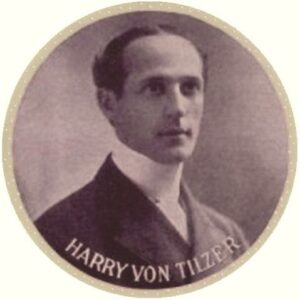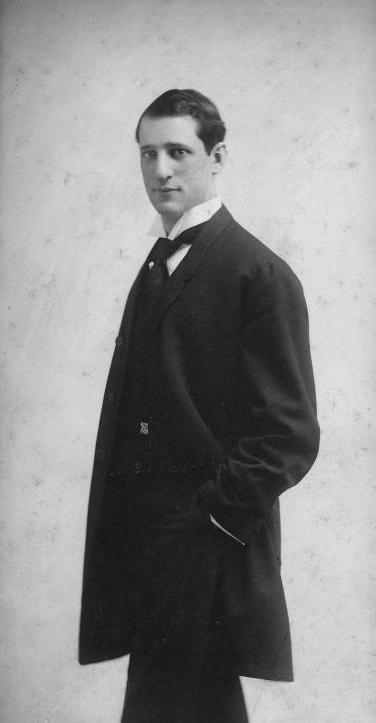
Photo info ...
Credit: Public domain via Wikimedia CommonsView Source
(Harry, July 8, 1872-Jan. 10, 1946; and Albert, Mar. 29, 1878-Oct. 1, 1956). Harry and Albert Gumbinsky (later Von Tilzer) were born to Jewish immigrants Sarah and Jacob Gumbinsky, who came from Vistytis, Lithuania, then part of Czarist Russia. The Gumbinsky family was part of the first wave of Jewish immigrants leaving Czarist Russia. The family settled in Detroit, Michigan where Harry Gumbinsky was born. Within a year they moved to Goshen, Indiana. There they found a large Jewish population, many of whom traced their roots to Vistytis, the Gumbinsky’s hometown. The Guminsky’s were in the retail business in Goshen. In 1878 their store burned down under suspicious circumstances and the family was accused of arson to collect insurance money. Following this incident, the Gumbinskys moved to the south side of Indianapolis, near in the heart of a neighborhood. Albert Gumbinsky (born Elias) was born here.
As a boy, Harry Gumbinsky was intrigued by local minstrels and shows. He joined a traveling repertory company at age 15, adopted his mother’s maiden name of Tilzer, and affixed “von” for theatrical appeal. He arrived in New York City in 1892, working as a comic vaudeville entertainer and aspiring composer.

Harry Von Tilzer’s first hit, “My Old New Hampshire Home,” was co-written with lyricist Andrew B. Sterling in 1898 and later sold two million sheet music copies. In 1902, he formed his own publishing company and produced such hit songs as “A Bird in a Gilded Cage,” “Wait ‘Til the Sun Shines, Nellie,” “I Want a Girl Just Like the Girl,” and “Alexander, Don’t You Love Your Baby No More?,” believed to be the inspiration for Irving Berlin’s “Alexander’s Ragtime Band.” Harry Von Tilzer reportedly composed 8,000 songs and published 2,000 before he died in New York City.
Albert Von Tilzer followed in his older brother’s footsteps, writing music for numerous hit songs: “Take Me Out to the Ball Game,” “I’m the Lonesomest Gal in Town,” “Where the Swanee River Flows,” “Oh, How She Could Yacki Hacki Wicki Wacki Woo,” “Dapper Dann, the Sheik of Alabam’,” and the World War ballad, “I May Be Gone for A Long, Long Time.” With brothers Will and Jack, he pursued a series of successful music publishing ventures until moving to Hollywood in 1930 to work in film music. He died in Los Angeles.

Help improve this entry
Contribute information, offer corrections, suggest images.
You can also recommend new entries related to this topic.